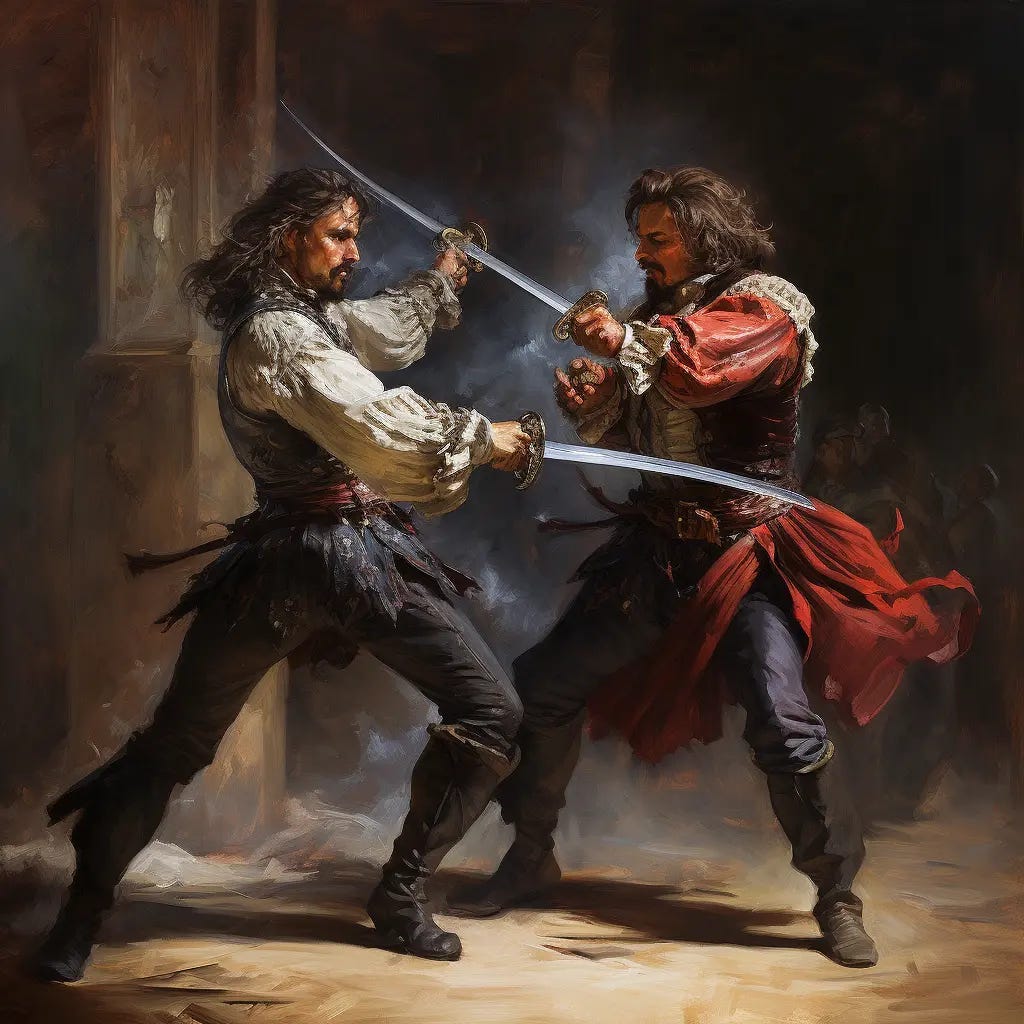Just One
Flash fiction, 800 words. For Iron Age's Nov. 29 prompt, "The Duel." Those swords annoy me, so that's what the story's about.

Jerome and Guy tested the blades. They were master fencers, or Ellis wouldn’t have asked them.
“Halt!” Guy disengaged with a throaty noise of disgust and tossed his “sabre” on the ground. It was short as a dagger and wide as a machete. “Tell Ellis this no good, hear me? No good.”
Jerome relaxed and stepped back. In his left hand was a blade slender as a foil, but with an edge. In his right was the same dagger-machete as had repulsed his friend.
“I have to agree.”
Jerome liked Ellis. The smith had a flair for invention and a steady bead on the populace’s boredom with the piste. But he didn’t agree that the problem lay with the weapons. It lay with their wielders. That included Jerome and Guy.
“This feels inelegant. I walk like a crab on the piste, eh?” Jerome scuttled for effect. “What do I need with two blades? One is enough for me.”
Jerome picked up what Guy had rejected and placed it on a table with the others. Guy could afford such antics. He was the Man in Red, notorious, deservedly so. That sort of fame had eluded Jerome, who made his living tutoring the young sons of minor nobility.
Guy tested Ellis’ creations because he was bored. Jerome tested them because Ellis had paid him two gold crowns.
They’d both volunteered because each was the only man who could still challenge the other.
The smith had been called away, but his apprentice was there. The boy rolled each weapon into a cloth and put them into cylinder he could carry through the streets. Naked weapons were not permitted outside.
“You tell him, Elroy. Tell him I will sit there while he works and say when his ideas are stupid.” Guy was kind to the boy but he was becoming impatient with the smith.
Well, why shouldn’t he be? The Man in Red’s time was valuable. Every duel spent testing new types of weaponry was one he couldn’t fight seriously. Neither fencer was getting any younger.
The smith’s boy carried the message. The men went to the same watering hole they’d visited weekly since they were 19-year-old conscripts. Guy paid the first round (they always had just the one).
“I think you could pull off two,” the Man in Red said after a moment.
“Huh? Which one of us is the show pony?” laughed Jerome. “They’d laugh me out of the salon.”
“It’s not like I can try.” The Man in Red only had one hand. He told a new tale to every asker. Half the city was convinced it was Jerome who’d lopped it off, such was the ferocity of their rivalry. But Jerome had been there the night the bonfire had collapsed on Guy. They’d both learned how to be left-handed together, so neither would have an advantage over the other.
“Ask Ellis to make you a sword-hand,” Jerome chuckled, half in earnest. “I think he would try.”
“He would succeed and my reputation would become something else entirely,” Guy gruffed. “I humor Ellis because the weapons he bothers to make properly are good indeed. Foibles pert as a maid’s …” Guy coughed. Thirty-eight years and widespread celebrity hadn’t cured him of boyish embarrassment.
“Rumor says Guillarme has one of his. You’ll be facing it on Friday.”
“Guillarme could have Excalibur and he’d still manage to trip on it.”
“I weep for the idiot who bets on him.”
“Fight me. Fight me truly, Jerome. Man to man, none of Ellis’ foolishness.”
“Have you tired of my company, then?”
“Who says you’d lose?”
“History. How’d you become the Man in Red? You bested me, remember? Eh? You say you don’t remember? Drink less, my friend, lest you become the Man in Red Wine.”
Jerome worried about Guy. Fame brought with it two friends who didn’t get along: complacency and restlessness. Guy had defeated every man in town. Ellis did a good business because no one could beat him with skill, they needed an edge. But Guy was not content because he had climbed the mountain peak and deemed it too close to earth.
Jerome worried about Guy because he knew that if they fought again, a true duel, Guy would lose.
The people would have that spectacle, just that one, and then they would have no hero, nothing to excite them except increasingly novel weaponry and duelists who were not fighters but performers.
They parted ways after that, Guy to a nap and Jerome to a baron’s townhouse. His young charge had not yet progressed beyond footwork. He was impatient but Jerome was not. A student who skimped on footwork would never become a Man in Red.
Jerome just hoped that when the lad grew up, the world would still want one.


Nice story, It's funny that the premise of the story came from your frustration with the image.